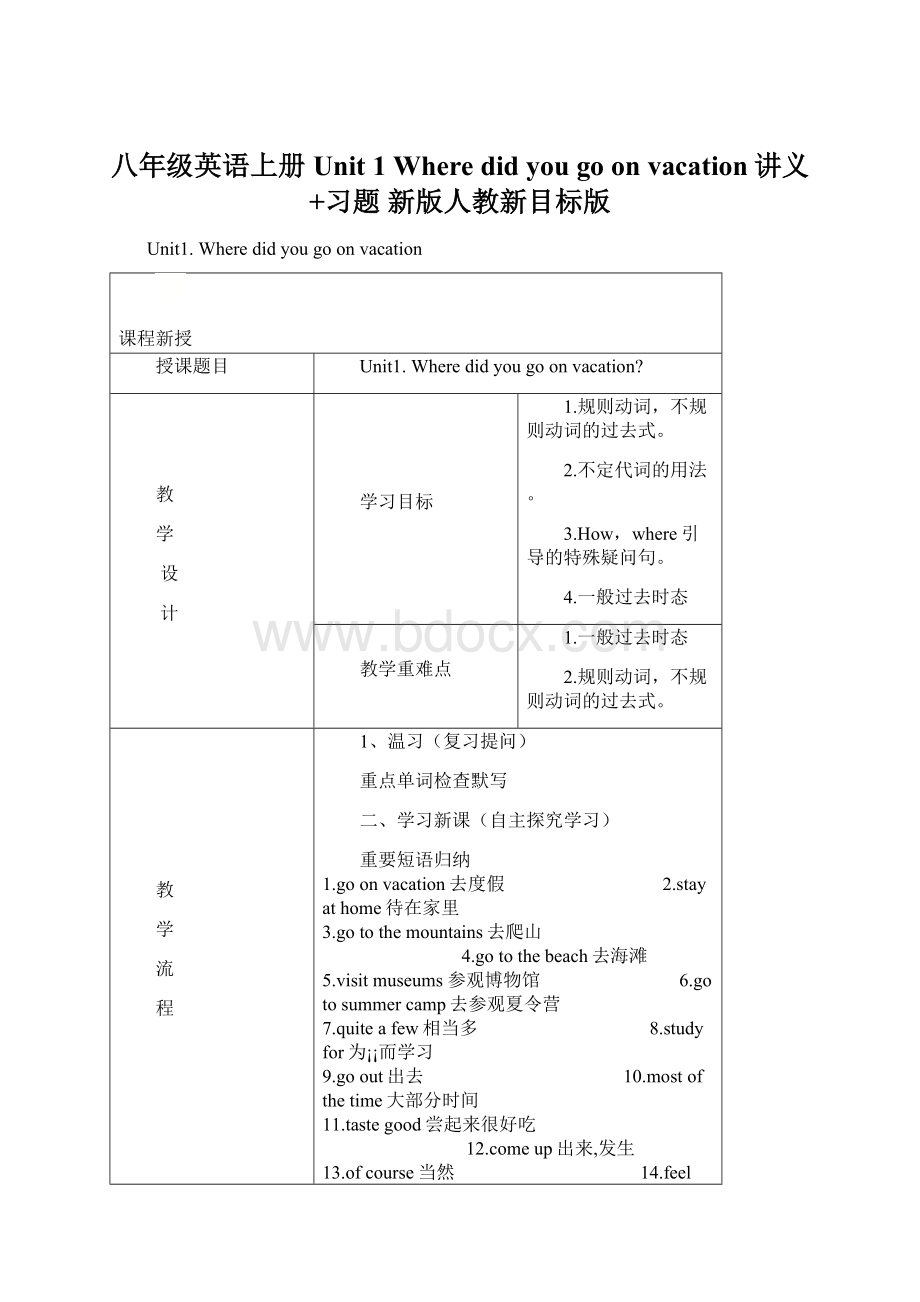八年级英语上册 Unit 1 Where did you go on vacation讲义+习题 新版人教新目标版.docx
《八年级英语上册 Unit 1 Where did you go on vacation讲义+习题 新版人教新目标版.docx》由会员分享,可在线阅读,更多相关《八年级英语上册 Unit 1 Where did you go on vacation讲义+习题 新版人教新目标版.docx(17页珍藏版)》请在冰豆网上搜索。

八年级英语上册Unit1Wheredidyougoonvacation讲义+习题新版人教新目标版
Unit1.Wheredidyougoonvacation
课程新授
授课题目
Unit1.Wheredidyougoonvacation?
教
学
设
计
学习目标
1.规则动词,不规则动词的过去式。
2.不定代词的用法。
3.How,where引导的特殊疑问句。
4.一般过去时态
教学重难点
1.一般过去时态
2.规则动词,不规则动词的过去式。
教
学
流
程
1、温习(复习提问)
重点单词检查默写
二、学习新课(自主探究学习)
重要短语归纳
1.goonvacation去度假 2.stayathome待在家里
3.gotothemountains去爬山 4.gotothebeach去海滩
5.visitmuseums参观博物馆 6.gotosummercamp去参观夏令营
7.quiteafew相当多 8.studyfor为¡�¡而学习
9.goout出去 10.mostofthetime大部分时间
11.tastegood尝起来很好吃 eup出来,发生
13.ofcourse当然 14.feellike给¡�¡的感觉;感受到
15.goshopping去购物 16.inthepast在过去
17.walkaround四处走走 18.becauseof因为
19.onebowlof…一碗¡�¡� 20.thenextday第二天
21.drinktea喝茶 22.findout找出;查明
23.goon继续 24.takephotos照相
25.somethingimportant重要的事 26.upanddown上上下下
27.haveagoodtime玩得高兴=enjoyoneself=have(great)fun
1.与seem有关的句式
1)seem+形容词 “看起来¡�..¡±Youseemhappytoday.
2)seem+todosth.“似乎、好像做某事¡± Iseemtohaveacold
3)Itseems/seemed+从句 “看起来好像¡;似乎¡�¡±. Itseemsthatnoonebelieveyou.
4)seemlike….“好像,似乎¡�..¡± Itseemslikeagoodidea.
2.toomany,toomuch,muchtoo
1)toomany“太多¡±,后接可数名词复数。
如:
Motherboughttoomanyeggsyesterday.
2)toomuch “太多¡±,修饰不可数名词或修饰动词作状语。
如:
?
Wehavetoomuchworktodo.
?
Don’ttalktoomuch.
3)muchtoo “太¡±,修饰形容词或副词。
如:
?
Thehatismuchtoobigforme.
?
You’rewalkingmuchtoofast.
小结:
分辨三者的口诀:
toomuch,muchtoo,用法区别看后头:
much后接不可数,too后修饰形或副。
toomany要记住,后面名词必复数。
7.because:
1)becauseof 介词短语,¡°因为,由于¡±,后接名词、代词或动名词,不能接句子。
如:
Hecan’ttakeawalkbecauseoftherain.
2)because连词,¡°因为¡±,引导状语从句,表示直接明确的原因或理由。
如:
Idon’tbuytheshirtbecauseitwastooexpensive.
8.trytodosth.与trydoingsth.
trytodosth:
尽力做某事;
trydoingsth.:
尝试做某事。
如:
Itriedcallinghim,butnooneanswered.
I'mtryingtolearnEnglishwell
9.forgettodosth.与forgetdoingsth.
1)forgettodosth.忘记将要做的某事
如:
Don’tforgettoclosethewindow.别忘了关窗户。
2)forgetdoingsth.忘记做过某事
如:
Iforgetclosingthewindow.我忘记已经关上窗户了。
10.stopdoingsth.与stoptodosth.
1)stoptodosth.停下了去做另一件事
如:
Istoppedtoeat。
我停下来开始吃东西。
2)stopdoingsth.停止做某事
如:
Istoppedeating。
我停止吃东西。
Remembertodo/rememberdoing
11.something,somebody,someone;anything,anybody,anyone
something,somebody,someone:
用于肯定句
anything,anybody,anyone:
用于否定句、疑问句或条件句
重点句型
1.Wheredidyougoonvacation?
你去哪里度假了?
1)这是一个由疑问副词where引导的特殊疑问句。
Where用来询问地点或场所,用于句首,其后跟一般疑问句。
如:
Whereareyoufrom?
Wheredoeshelive?
2)goonvacation“去度假¡±
Hewillgoonvacationwithhisfamily.他要和家人一起度假。
2.Didyoubuyanythingspecial?
你买特别的东西了吗?
1)buy,vt,¡°购买¡±
如:
Ittakesalotofmoneytobuyahouse.买一座房子要花一大笔钱。
2)buysth.forsb.=buysb.sth.为某人买某物
如:
Myfatherboughtmeabike.
=Myfatherboughtabikeforme.
3)anythingspecial“特别的东西¡±
注意:
形容词修饰不定代词要后置
如:
Doyouwantanythingelse?
你还想要其他什么吗?
3.Wetookquiteafewphotosthere.
1)takephotos照相,拍照
如:
Couldyouhelpmetakesomephotos?
2)quiteafew“相当多¡±,后加可数名词复数
quitealittle“相当多¡±,后加不可数名词
如:
Therearequiteafewpeopleintherestaurant.
Thereisquitealittlewaterinthebottle.
4.Everythingtastedreallygood.所有的东西尝起来真的很好吃。
taste,连系动词,¡°尝起来¡±,其后接形容词构成系表结构。
如:
Thefoodtastesreallygreat.
与之类似的词:
sound(听起来),feel(摸起来),look(看起来)。
5.Howdidyoulikeit?
你觉得它怎么样?
用来询问对方的观点或看法。
=Whatdidyouthinkofit?
=Howdidyoufeelaboutit?
6.Didyougoshopping?
你们去购物吗?
goshopping“去购物¡±
拓展:
godoing“去做某事¡±,常用于表达从事某一体育活动或休闲活动。
如:
goclimbing ;goskating(去滑冰);gohiking;gosightseeing;gofishing ; goboating(去划船)
7.Iwenttoafriend'sfarminthecountrywithmyfamily.我和家人一起去了乡下一个朋友的农场。
afriend'sfarm是名词所有格形式,¡°一个朋友的农场¡±。
8.Theonlyproblemwasthattherewasnothingmuchtodointheeveningbutread.唯一的问题是晚上除了读书没什么事可做。
nothingadjtodo“没什么事可做¡±
如:
Ihavenothingspecialtodothisafternoon.今天下午我没有什么特殊的事要做。
拓展:
nothingbut“只有,除..之外什么也没有¡±;
havenothingtodobutdosth.“只能做某事¡±=havenochancebuttodosth.
如:
Ihadnothingbutacupofteathismorning.我今天早上只喝了杯茶。
IhadnothingtodobutwatchTV.w我只能看电视了。
9.Stillnooneseemedtobebored.仍然没有人看起来无聊。
1)Seem可作不及物动词或连系动词,¡°好像,似乎,看来¡±
如:
Everythingseemseasy.
拓展:
1)bored,boring辨析
Bored:
¡°厌倦的;感到无聊的¡±,一般在句中修饰人,作表语。
Boring:
¡°无趣的;令人厌烦的;单调的¡±,一般在句中修饰事或物,可作表语和定语。
如:
I'mboredwithwhathesaid.
Ifindthestoryveryboring.
10.WhatdidLisasayabout...?
Sayabout“发表对...的看法¡±
如:
Idid'tsayanythingaboutit.我对此事什么也没说。
11.IarrivedinPenanginMalaysiathismorningwithmyfamily.今天早上我和家人到达了马来西亚的槟城。
1)arrive,vi,¡°到达¡±。
2)arrivein+大地点;arriveat+小地点 “到达某地¡±
如:
Thebookswillarrivetomorrow.这些书明天到。
WearrivedinBeijingyesterday.我们昨天就到北京了。
Iarrivedatthetrainstationveryearly.
12.sowedecidedtogotothebeachnearourhotel.
4、因此我们决定到旅馆附近的海滩上去。
1)gotothebeach去海滩
2)decide,vt,“决定”,decidedtodosth.“决定做某事”
如:
Theydecidetovisitthemuseum.
13.IfeellikeIwasabird.Itwassoexciting.我感觉自己就像一只小鸟,太刺激了。
feellike“给...的感觉,感受到”,,其后常接从句。
如:
IfeellikethatIhaveneverbeentherebefore.我感觉从来没到过那。
feellike“想要”,,其后可接名词、代词、动名词。
如:
Doyoufeellikeacupofteanow?
你现在想要喝茶吗?
14.Ireallyenjoyedwalkingaroundthetown.我真的很喜欢在镇上到处走走。
enjoyoneself=haveagoodtime=havegreatfun“玩的高兴,愉快”
如:
Ienjoyedmyselfatthepartylastnight.
=Ihadagoodtimeatthepartylastnight.
=Ihadgreatfunatthepartylastnight.
15.Whatadifferenceadaymakes!
一天的变化有多大啊!
本句是what引导的感叹句。
拓展:
感叹句的结构:
1)what a/an (adj)+单数的可数名词+主语+谓语!
2)What(adj)+复数的可数名词/不可数名词+主语+谓语!
3)How+adj/adv+主语+谓语!
如:
Whatabeautifulgirlsheis!
Whathardworkitis!
Whatmanyflowersthereis!
Whatapity!
16.Wewantedtowalkuptoshop,butthenitstartedrainingalittlesowedecidedtotakethetrain.我们想步行爬到山顶,但是天开始下起了小雨,因此我们决定乘火车去。
1)Wanttodosth.
如:
Iwanttocleanmybedroom.
2)startdoingsth=starttodosth.开始,可与begin互换。
如:
Hestarteddoinghishomework.
但以下几种情况不能用begin:
?
创办,开办:
Hestartedanewbookshoplastmonth.
?
机器开动:
Ican’tstartmycar.
?
出发,动身:
Iwillstarttomorrowmorning.
2)enough
a)形容词,“足够的,充分的”,作定语修饰名词
如:
Wehaveenoughtimetodoourhomework.
b)副词,“足够地,充分地”,用来修饰形容词或副词,一般置于被修饰词之后
如:
Iknowhimwellenough我对他足够熟悉。
19.Whynot?
为什么不呢?
Whynotdosth.为什么不做某事呢?
如:
Whynotgotothepartywithme?
=Whydon’tyougotothepartywithme?
20.Twentyminuteslater,thesunstartedtocomeup.20分钟后,太阳开始升起来了。
Comeup“出现,发生”
如:
Pleaseletmeknowifanythingcomesup.如果发生什么事的话,请让我知道。
21.MylegsweresotiredthatIwantedtostop.我的双腿太累了,以至于我都想停下来。
So…that…:
“如此…以至于…”,引导结果状语从句,句中的so是副词,常常用该修饰形容词或副词。
拓展:
Sothat引导目的状语从句,“以便,为了”
如:
Hegetsupearlyeverymorningsothathecancatchuptheearlybus.
目标检测:
1.-----_________didyoudolastnight?
------Iplayedcomputergamesinmybedroom.
A.WhatB.HowC.WhyD.Where
2.Mostofthe____________veryhot.
A.city;isB.city;areC.cities;areD.cities,was
3.Ispend2hoursdoingmyhomeworkandIneed_____tofinishit
A.theotherhourB.anotheronehourC.oneanotherhourD.anhourmore
4.-------_______didyou________thesummervacation?
-------Itwasterrible.Ihavetoomuchhomeworktodo.
A.What;thinkB.How,likedC.How;thinkofD.How;feelabout
5.Whenit’sveryhot,I_______swimminginthepool.
A.wouldlikeB.wantC.feellikeD.decide
6.Thechildrenaretooyoungtolookafter______.
A.myselfB.themselvesC.theyD.yourself
7.It’sonly19:
00,wedecide______home
A.goingB.gotoC.nottogoD.nottogoto
8.Wehadgreatfun___thevolleyballmatchbetweentheChineseteamandJapaneseteam.
A.watchB.watchedC.watchesD.watching
9.Howabout________adrink?
A.haveB.tohaveC.hadD.having
10.Theteachermademe________atschoolbecauseIdidn’tfinishmyhomeworkyesterday.
A.stayB.stayingC.tostayD.stayed
11.------Is_______here?
-------Bobisnothere.
A.everyoneB.anyoneC.someoneD.nobody
12.Ihad________moneyforataxi,soIwalkedhome.
A.noB.someC.anyD.alittle
13.Ifoundanelephant________acrosstheriver.
A.walksB.walkedC.towalkD.walking
14.I________youyesterdayafternoon,butyou________athome.
A.call,aren’tB.amcalling,aren’tC.called,wereD.called,weren’t
15.Aquarter______,wefeltverythirsty.
A.lateB.afterC.laterD.behind
16.Thereare______people,soit’sverycrowded(拥挤的).
A.quiteafewB.alotC.alittleD.few
17.Dogsarelike______tousandtheyare______tous.
A.friends;friendB.friends;friendlyC.friendly;friendsD.friend;friendly
18.Weare_______whenwehearthe________news-wedon’thaveclassestomorrow.
A.exciting;excitedB.excited,excitedC.excited;excitingD.exciting;exciting
19.Thefoodthereis________.I’lltakeyoutherenexttime.
A.deliciousB.terribleC.awfulD.wonder
20.Wehadgreatfun________inthewaterlastweekend.
A.playB.playedC.playingD.toplay
21.Thefoodis________,butIdon’thave________tobuy.
A.enoughexpensive;enoughmoneyB.cheapenough;enoughmoney
C.expensiveenough;moneyenoughD.enoughexpensive;moneyenough
22.Thereisn’t______withyourbicycle,youcanridehome.
A.somethingwrongB.anythingwrongC.wrongsomethingD.nothingwrong
23.----